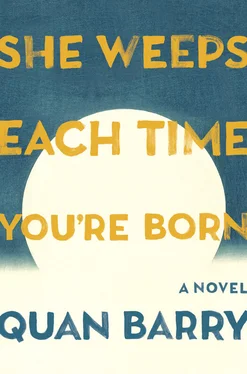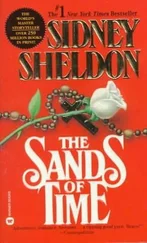Not your mother. Not Hong Hanh, who is actually fourteen and lives in Village Eight with her whole clan from Ha Nam. Hong Hanh, whom you’ll meet in the grand kitchen of the propriétaire , the copper pots and saucepans hanging from iron hooks. Nobody. Personne . Not a single soul will ever understand the unworldly rapport between you and this man. You barely understand it yourself.
It happens like this: there is a riot in Village Two. Village Two is one of the original villages. Some of the workers have been cutting the trees there for more than a decade. As Village Two is more than fifteen miles away, news of the riot doesn’t reach your village for almost a full day. The night after it happens the first of the rioters begin to trickle into your sector well past midnight. When they knock on the barracks door, only he will rise and step outside, the man with the palms white as cream standing in the moonlight and patiently drawing a map in the dirt. The man tells them which river the dogs won’t ford, which mountain tribes are friendly, which to avoid at all costs.
And so a new girl is needed in the kitchen. The girl from Village Two who used to work there doing whatever was needed has disappeared along with her family. The truth is maybe one of the overseers saw an opening and took it, lured her out into the field of new saplings by Village Fifteen, and did what he’d been waiting to do, ultimately burying her body there beneath the young trees where they will grow and mature and bleed for years. Who can know for sure?
Two days after the riot you are filling your bucket out among the rubber trees when one of the LeBonne brothers appears and says come with me. His skin is pitted as if with a needle. You turned ten years old in the fall, though you are starting to look fourteen. For the rest of the day your mother, who was only a half mile away when you were driven off, will be tearing her hair out.
In the grand house you see things you have never seen before. Indoor plumbing. Gas stoves. Lace so fine it hurts just to look at it. Staircases carved in teak. Ivory and china and the fabric they use to blow their noses in finer than anything you have ever touched.
This is where you will grow up, not out there under the rubber trees and the watchful eye of the other LeBonne with the battered rattan cane he is never without, your hands callused like leather, fingers peeling and raw where the white sap sticks to them and won’t come off. No. This is the world the world has been hiding from you. Massenet. Lavender. Madeleines. Taupinière. A world of leisure, though the hours of sweet inactivity are not for you. You will work as hard as ever in this other world.
Time passes. The war arrives. Nobody is allowed to leave. Because Vietnam shares a border with China, the battle-thirsty Japanese invade, desperate to keep Vietnamese supplies from the Chinese. Occupied France allies herself with Japan, and now Indochine has a new ruler. On the plantation three-year contracts are extended indefinitely because where would you go, child? The Japanese have faces like yours but different somehow, eyes smaller, hard as knives, eyes as if entirely made of pupils, like insects with their compound lenses. Mostly it doesn’t matter. The French are still very much in charge because business is business, and the Vichy are accommodating, though the young mademoiselle sits at the piano crying that her life has been ruined, that she will never stroll the Seventh Arrondissement with a lover on her arm. Mon pauvre petit chou , you say, fanning her with a banana leaf. My poor little cabbage.
You no longer sleep in the barracks but in the servant quarters with Hong Hanh and the rest of the staff. The few times you see her, your mother says she is happy for you. Your French is flawless in that way children pick up foreign languages without even trying. Once when you haven’t seen her for months, you barely recognize her, the lines in her dark brown face as if gouged with an awl. The first time you call your mother Maman , she looks stricken, as if you’ve just hit her.
Though you never forget the moment by the cashew tree, as the years pass you only see the man with the beautiful palms every now and then, mostly when the French garagiste sneaks him into the building just off the main house where they keep the Saoutchik shipped in all the way from Marseilles so he can work on the great black car so polished it always looks wet, the thing bigger than any room you have ever shared or ever will. The way the man with the beautiful hands can intuit what is wrong, twisting the right cap, replacing the right part, with the result that the engine purrs back to life and the garagiste can hold his head up around the grounds. You always knew the man was magical, his hands like blank pages. This is the proof.
Today the garagiste yells through the back door to bring them some coffee. Though you are in the middle of boiling the napkins, there is no one else around, so you do as you’re told. You make it just the way the propriétaire himself likes, the aroma so bitter you wince at the smell. You leave it in the press and carry the tray outside, your house dress just below the knee, your body fully blossomed, eyes clear as glass. In the night when Hong Hanh is asleep, the breath sniveling out through her nose, you are learning how to touch yourself. Sometimes you think of him, the man with the perfect hands, the light in his eyes seemingly faceted like a cat’s, and when you do, it happens faster.
For a moment you stand in the light of the garage. He is under the great black hood. You can see yourself reflected in the liquid metal — a girl holding her heart out in front of her. Then he comes out from under it and everything is as you’ve remembered. Even under the grease his hands shine like moonlight. The garagiste is nowhere in sight. Thuan, the man says. It is the only time he will ever speak your name. The rooms in your heart flooding.
In the days after the European war is over, when the danger in Vietnam is at its most extreme as Indochine steadies herself to fight the French imperialists, Hong Hanh will say this is why the man with the lily-white palms befriended you. Because you have access. You can get him keys and maps and help him drug the dogs and tell him things about the cycles of the great house. You stand in the pantry with your hands folded across your chest. Ta guele! you shout at your best friend. And years later, after all the passion has drained from your body, you will keep the physical memory of your first afternoon of love, July 1945, the propriétaire ’s niece to marry that very week, the tent like a great sail staked out under the flowering cashew trees, the man beaten, his back laced with welts, and how he brought out the dragon fruit nevertheless, the thing he had been hiding just for you, and the way he brought it out from the dark cave of his body where he had kept it hidden between his legs as the overseers beat him with their canes, the LeBonne brothers with their homicidal rages blind to who he was, not knowing that stealing the fruit was the least of it, that he was Vietminh, that he was organizing the workers, that nights he would read to them from Than Chung and Humanité , the French Communist paper, tales of workers finding their voices, the collective power of their awakening, of sûréte agents and managers and armies of overseers being overthrown at last, and the memory of that first time when the man peeled the fruit for you and watched you eat of it, and the way he took you in his arms, and all the while you were careful not to touch his back as he moved into you and you felt the little death creeping up on and on until you died and he moved in you until you died again and you said I’m yours I’m yours I’m yours I’m yours you never stop saying it even when someone tells the overseers about the two of you there on the eve of the August Revolution, Ho Chi Minh with his declaration prepared, the war in Europe over, the Japanese emperor declared just a man, August 1945 and Ho Chi Minh né Nguyễn Sinh Cung with his letter of friendship to Harry S. Truman which will go unanswered ready to tell all the world that after a thousand years Vietnam is Vietnam’s at last but before it happens the LeBonne brothers come and drag you out of your bed and put you in a room where a series of Frenchmen ask you where is he and it goes on and on until one of them puts his cigarette out on your chest not because he thinks it will bring an answer but because he can the burning going all the way down to your heart a window a hole that lets the light in gives you second sight a way of seeing in the dark which is why now at the end of everything you see yourself lying on a highway in the middle of fleeing millions a girl a child kissing your scar light of my blood everything spilling into her so that you can finally rest but it isn’t the end, n’est-ce pas ? After life there must be life.
Читать дальше












